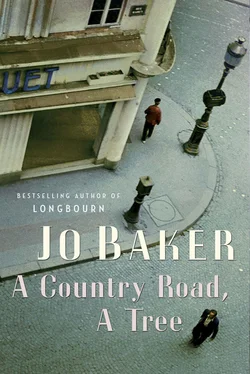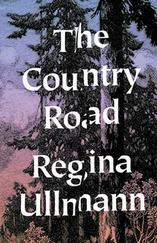“Do you know where they’ve taken him?” he asks.
She wipes her cheeks, blows out a breath, composes herself.
“Drancy. He’s been taken to Drancy.”
It’s on the edge of Paris. A nasty unfinished little housing project that they have looped around with wire.
“Have you seen him?”
“I went out there, but they wouldn’t let me see him.” She rolls her lips in, biting on them; her eyes brim. “But I have heard that he’s been tortured.”
“My God.”
She closes her eyes; tears run. She shakes her head. “He’s done nothing, he’s got nothing to confess. If he could give them something, if he had something to give, then perhaps—”
“Oh Lucie.”
She takes a breath, swipes away tears again, making an effort to still herself. She says, “He’s quite weak, I hear.”
“But you haven’t seen him?”
“No. There’s a woman. She told me.”
“Oh?”
“She lives out there, near the camp. It’s just a shell, that place; there’s no proper food, everyone’s ill. But she says that if I can get a food parcel together, she can get it to him.”
She pushes away a curl that has fallen loose. Her smile is brittle and it does not last.
“So that’s something,” she says.
He sits back. Blows out a long breath. Now, at last, there is something he can do.
—
The concierge peers at him, back again so soon. She is dark and squat and there is a fleshy growth on the side of her nose the size of a collar stud, which the eye snags on involuntarily; it must happen to her all the time because she doesn’t seem to take offence. She follows his passing with a blink and an upward tilt of the chin that he takes for approval. He’ll assume that she is decent. That’s all that can be required of anybody: decency. Everything else follows from that, or from its absence.
His knock is followed by a moment’s anxious pause. But then there is the clack of shoes on the parquet, and the door inches open and Lucie’s pale face appears again: anxiety melts into bafflement. She opens the door wide and goes to usher him in.
“I’m not stopping.” He holds up a grubby canvas shopping bag. “Just wanted to leave this.”
The bag is shaped by tins and packages. A baguette pokes grey-beige out of it. She looks at the bag, the bread, at him. She doesn’t move.
“Actually,” he says, and holds up a finger. “Two ticks. Suzanne will miss the bag.”
He pulls out the baguette and the pack of cigarettes, and a tin of anchovies and one of corned beef and a waxy block of cheese wrapped in paper. He passes the things to her, and she takes them off him to be helpful, filling her arms automatically, not yet really understanding.
He bundles up the bag and stuffs it into a trouser pocket. “I’m sorry it’s not more.”
The groceries are too much to hold — the baguette’s crushed under an arm, a tin is slipping. She tries to hand them back to him. He wafts the attempt away.
“They’re yours,” he says.
“No…”
“It’s for Paul; for the parcel.”
She shakes her head, a kaleidoscope shake, to make a pattern out of chaotic bits. “But. No. Because you need it yourself.”
“Get it to Paul.” He gives her an awkward pat. “I’ll see you soon, Lucie.”
He heads along the brown corridor and down the slow spiral of the wooden stairs, past the woman with the little button on the side of her nose, who, being decent, gives him a half-nod. He nods back and opens the door on to the street, the grey sky, Paris, straight on to the crunch of uniform boots and the skim of green-grey jerkins. He stands frozen. The soldiers pass as a chill in the air. When they are gone, he steps over the threshold, easing the little porte cochère shut behind him, and turns in the opposite direction, for no other reason than it is the opposite.
He only once looks back, when he comes to the corner. The street is void, as though the people have dripped through the gaps between the cobbles and oozed into the cracks between the paving stones.
His head swims; the street seesaws. His hand, when he reaches out for balance, has become his mother’s hand, crabbed and veined and shaking. He wants rillettes and cornichons, a boiled egg, a piece of bacon, a bowl of steaming moules. Bread and butter.
He leans back against the wall. He’s sweating. Cold.
A smoke.
A smoke will have to do.
He rifles for his cigarette packet, peers in at the remaining cigarette. Dry filaments of tobacco curl from the open end; the paper is ragged and softened. He looks at it for a long time. He touches it with a fingertip. Then he slips the packet back into his pocket. He pushes away from the wall and begins his long walk home.
—
“Here’s something you never see any more,” she says.
He rolls his head round on the pillow to look at her, eyebrows raised.
“Spoiled fruit,” she says.
He studies her profile, the soft nap of her skin. Despite the lines at her eyes, there’s still something of the girl about her, even now, even in the middle of all this, with her hair all fallen anyhow, and her gaze vague and turned towards the ceiling and her thoughts freewheeling and ravenous.
He wets cracked lips. “True.”
“Or vegetables.”
He nods.
“Because you’d see it all the time, wouldn’t you, on a market day. There’d be bruised apples that’d rolled off a barrow. Or oranges, on the cobbles, burst open, wasps on them; kids would kick them around. Sometimes you’d see an old fellow, a clochard would be picking them up, stuffing them in his pockets. Fallen fruit, all bruised and gritty.”
“I remember.”
“But you never see that any more.”
“No.”
“Or the tramps, for that matter.”
“No.”
“They’re all gone too.” She considers this a moment. “The days when you could pick up an orange off the street, can you imagine? God, I’d love an orange. Even if I had to fight the wasps for it.”
“Or the tramps.”
She smiles. Her teeth show. Her gums are pale.
“A bad orange is really bad, though,” he says. “I’d take a bad apple over a bad orange, any day.”
“Depends how bad.”
A long pause, in which both of them consider the relative merits of spoiled fruit. Then: “No one feeds the pigeons any more.”
“One might, if one thought it might get one close enough to catch it.”
A moment passes, and then she says, “Pigeon pie. I could eat a pigeon pie, couldn’t you? With potatoes in it, and carrots.” She still stares up at the ceiling. Her lips compress, her chin crumples.
“Potatoes aren’t rationed yet,” he says.
“But you can’t get hold of them anyway.”
“Or carrots, or radishes, or turnips, they’re not rationed.”
“I know.”
A silence.
“It will be all right…,” he says.
She doesn’t roll her eyes. But she can’t stop herself from expelling a huff of breath, almost a sigh, and twisting her head round on the pillow to give him a long look.
“I’m not that bothered anyway,” he says. He wets his lips again. There’s a sharp catch on the tongue there, and a taste of blood where the skin has split. His voice is dry too, and sounds dusty when he speaks.
“I don’t expect you…,” he says. “Just because I…”
She does roll her eyes now. Heaves up on to an elbow, the better to glare at him.
“That’s not how it works,” she says. “Of course that’s not how it works. You know that. I’m not going to stuff myself with bread while all you’ve got to eat is turnips.”
After a moment, he says, “Lucie was desperate.”
She blinks, sighs, flops back down on her pillow. “I know.” Then she says, “I keep thinking of omelettes. What I’d give for a mushroom omelette. The kind where the mushrooms are cooked almost black and there’s that inky juice seeping out of it, and the eggs are a bit crisp on the outside, but still soft and oozy in the middle. You might get the mushrooms, if you were lucky, but where would you get the eggs for it now?”
Читать дальше










